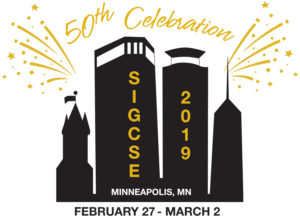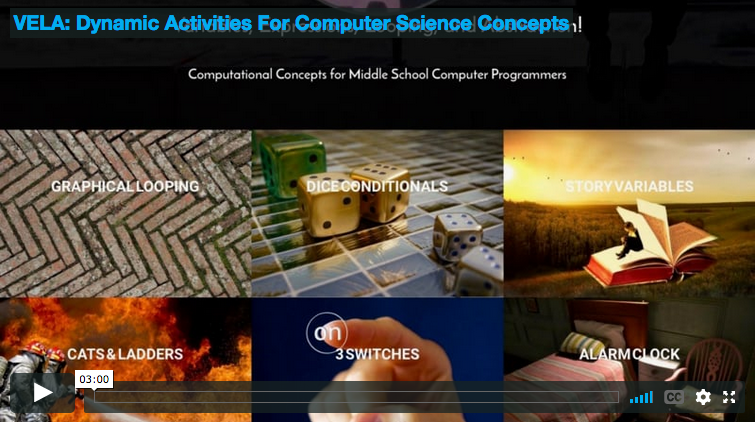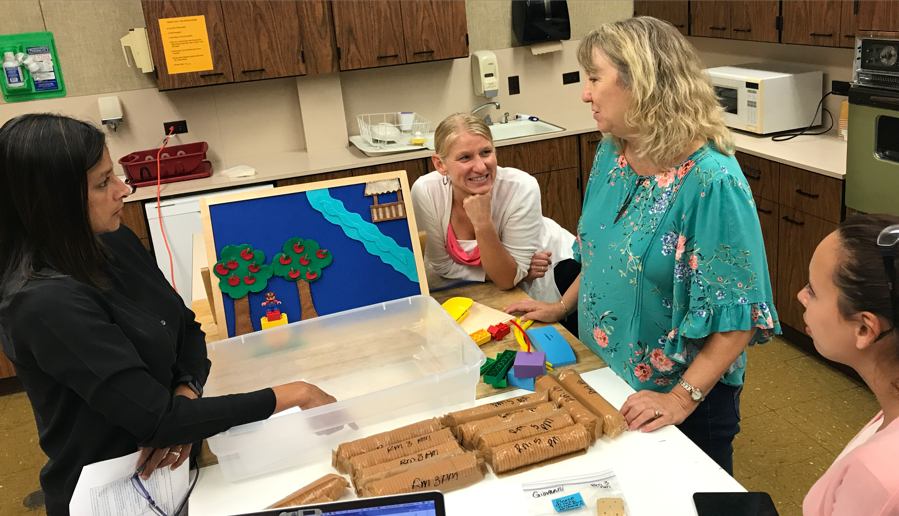 The countdown has begun for the 50th installment of my favorite conference: The Technical Symposium of ACM’s Special Interest Group on Computer Science Education (SIGCSE)! In 10 days’ time, 1,500 researchers and educators pursuing computer science education as a research and/or teaching endeavor will congregate in freezing cold Minneapolis, MN, from February 27 to March 2, 2019. Excitement for an upcoming SIGCSE has rarely been higher. Members of the SIGCSE Board have been creating and blogging a 50-year timeline, ACM opened up the digital repository of SIGCSE papers from the prior 49 meetings for the 8 weeks leading up to the convening and has published articles stirring up enthusiasm for this momentous event, and the normally reticent @SIGCSE_TS twitter account as been serving up tweets with interesting tidbits of SIGCSE history and corny CS humor.
The countdown has begun for the 50th installment of my favorite conference: The Technical Symposium of ACM’s Special Interest Group on Computer Science Education (SIGCSE)! In 10 days’ time, 1,500 researchers and educators pursuing computer science education as a research and/or teaching endeavor will congregate in freezing cold Minneapolis, MN, from February 27 to March 2, 2019. Excitement for an upcoming SIGCSE has rarely been higher. Members of the SIGCSE Board have been creating and blogging a 50-year timeline, ACM opened up the digital repository of SIGCSE papers from the prior 49 meetings for the 8 weeks leading up to the convening and has published articles stirring up enthusiasm for this momentous event, and the normally reticent @SIGCSE_TS twitter account as been serving up tweets with interesting tidbits of SIGCSE history and corny CS humor.
All papers from all 49 meetings of the @SIGCSE_TS are open access for the next 8 weeks, in celebration of SIGCSE's 50th anniversary! https://t.co/kXiAxsDkwd …
— Briana Morrison (@Bri_Morrison) January 11, 2019
The first SIGCSE Symposium was held in Houston, Texas in 1970. We looped back to Texas again in 1991, 2000, 2006, and 2011. Or is that recursion? #SIGCSE2019
— SIGCSE Symposium (@SIGCSE_TS) February 15, 2019
// #SIGCSE2019
while (date < '2019-02-27') {
anticipation++;
excitement *= 2;
}— SIGCSE Symposium (@SIGCSE_TS) February 13, 2019
We tried to book a band named 1023 Megabytes for the SIGCSE reception this year, but they couldn't do the gig. SIGCSE Rocks! #SIGCSE2019
— SIGCSE Symposium (@SIGCSE_TS) February 10, 2019
As the largest annual gathering of computer science educators and/or researchers anywhere, SIGCSE provides an unparalleled opportunity to meet with researchers and practitioners alike and share research/experience reports, nifty assignments, demos of tools, and works-in-progress with both key communities. Although Europe (and now Asia) host their own versions of CS Education conferences, this one attracts a large number of non-US attendees as well.
SIGCSE has always been a very special to me personally. For every single year these last 8 years (ever since I started actively publishing CS Ed research), I have enjoyed the opportunity to share my research through paper presentations, lead/participate in birds of a feather sessions, and give lightning talks. This year is no different. What *is* different though, is the number of different things I am presenting/participating in. I’m on a paper, a poster, a demo, and delivering a lightning talk. (See brief descriptions below). The paper, poster, and demo showcase 3 different NSF STEM+Computing projects that I have had the pleasure to lead/co-lead these past 2-4 years. (They span PreK through high school levels!). In addition, there is a meeting of the ACM Education Board & Education Advisory Committee (of which I am a member), and for the very first time, an ACM-hosted meeting of the editorial board of ACM Transactions in Computing Education (ACM’s only research journal dedicated to CS Education). With Mark Guzdial winning the 2019 SIGCSE Award for Outstanding Contribution to CS Education, this SIGCSE promises to be super exciting, all in all.
I hope to see many of my CS Ed and #CSForAll sisters/brothers-in-arms there!
 Paper: Non-Programming Activities for Engagement with Foundational Concepts in Introductory Programming. In this paper, we share how novel activities designed for early conceptual exploration can support middle school students’ engagement with and learning of foundational programming concepts beginning programmers often struggle with, specifically, variables, expressions (Boolean, arithmetic, relational), loops, and abstraction. We drew on mathematics education research on dynamic representations to design and develop a set of four non-programming (open access) web-based interactive activities and micro-worlds, and two unplugged activities as part of a suite of activities that can be embedded in a typical introductory programming curriculum to introduce learners to the target concepts before they encounter them in programming. Our recent journal publication on this research prompted some cool adaptations by Phil Bagge that he shared on twitter! (Grover, Jackiw, & Lundh; NSF #1543062 in collaboration with SRI International)
Paper: Non-Programming Activities for Engagement with Foundational Concepts in Introductory Programming. In this paper, we share how novel activities designed for early conceptual exploration can support middle school students’ engagement with and learning of foundational programming concepts beginning programmers often struggle with, specifically, variables, expressions (Boolean, arithmetic, relational), loops, and abstraction. We drew on mathematics education research on dynamic representations to design and develop a set of four non-programming (open access) web-based interactive activities and micro-worlds, and two unplugged activities as part of a suite of activities that can be embedded in a typical introductory programming curriculum to introduce learners to the target concepts before they encounter them in programming. Our recent journal publication on this research prompted some cool adaptations by Phil Bagge that he shared on twitter! (Grover, Jackiw, & Lundh; NSF #1543062 in collaboration with SRI International)
Wonderful Y5 pupils programming projects starting with story variables intro inspired by @shuchig research then writing an algorithm before programming in lovely @scratch (we have done simpler variable work prior to this lesson) #caschat #csk8 pic.twitter.com/iVbgiQBFg5
— Phil Bagge (@Baggiepr) February 13, 2019
 Poster: Integrating Computational Thinking in Informal and Formal Science and Math Activities for Preschool Learners. How do we integrate requisite thinking skills into children’s earliest informal and formal learning experiences in order to prepare the next generation of problem solvers? An interdisciplinary team of early learning, STEM, & CS Ed researchers examines how Computational Thinking (CT) skills align to the abilities and interests of young children and can be integrated with other STEM learning activities in order to promote school readiness, especially for children from underrepresented backgrounds. Our activities are being developed through a co-design process with teachers and parents to be incorporated in natural school and home activities. (Grover, Dominguez, Kamdar, Vahey, Gracely & Rafanan; NSF #1639850 in collaboration with Digital Promise Global and SRI International).
Poster: Integrating Computational Thinking in Informal and Formal Science and Math Activities for Preschool Learners. How do we integrate requisite thinking skills into children’s earliest informal and formal learning experiences in order to prepare the next generation of problem solvers? An interdisciplinary team of early learning, STEM, & CS Ed researchers examines how Computational Thinking (CT) skills align to the abilities and interests of young children and can be integrated with other STEM learning activities in order to promote school readiness, especially for children from underrepresented backgrounds. Our activities are being developed through a co-design process with teachers and parents to be incorporated in natural school and home activities. (Grover, Dominguez, Kamdar, Vahey, Gracely & Rafanan; NSF #1639850 in collaboration with Digital Promise Global and SRI International).
 Demo: Integrating Computational Modeling in K-12 STEM Classrooms: C2STEM is a web-based learning environment founded on a novel paradigm that combines block-structured, visual programming (in Snap!) with the concept of domain specific modeling languages (DSMLs) to promote the synergistic learning of discipline-specific and computational thinking (CT) concepts and practices. Our design-based, collaborative learning environment aims to provide students in K-12 classrooms with immersive experiences in CT through computational modeling in realistic scenarios (e.g., building models of scientific phenomena). Our current research with C2STEM involves learning of a kinematics unit in high school Physics classrooms and a marine biology unit in middle school. (Biswas, Hutchins, Ledeczi, Grover, & Basu; NSF #1640199 in collaboration with Vanderbilt U, Stanford U, Salem State U, and SRI International).
Demo: Integrating Computational Modeling in K-12 STEM Classrooms: C2STEM is a web-based learning environment founded on a novel paradigm that combines block-structured, visual programming (in Snap!) with the concept of domain specific modeling languages (DSMLs) to promote the synergistic learning of discipline-specific and computational thinking (CT) concepts and practices. Our design-based, collaborative learning environment aims to provide students in K-12 classrooms with immersive experiences in CT through computational modeling in realistic scenarios (e.g., building models of scientific phenomena). Our current research with C2STEM involves learning of a kinematics unit in high school Physics classrooms and a marine biology unit in middle school. (Biswas, Hutchins, Ledeczi, Grover, & Basu; NSF #1640199 in collaboration with Vanderbilt U, Stanford U, Salem State U, and SRI International).




